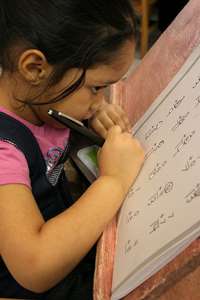It's Teacher Appreciation Week, and we want to highlight one of our favorite teachers: Emily Coleman is a mother of three children, one of whom is visually impaired, and a teacher of the visually impaired (TVI). She is also the voice behind Raising a Child Who Is Blind and...", a popular FamilyConnect blog. We asked her to tell us what the Cogswell-Macy Act would mean to her as a parent and as a teacher. As part of a national campaign to better meet the special needs of students with visual impairments, we ask that you take a moment to learn about the Cogswell-Macy Act and lend your voice to help us get congressional sponsorship for this important legislation, which has the support of more than 40 organizations.
Emily Coleman: As I understand it, the Cogswell-Macy Act will require schools to identify all children with visual impairment so that they will then receive the kinds of training and education they need. This is so important. It can come as a surprise to people, because they think that visual impairment is an obvious disability, but there is a problem identifying kids who are blind or visually impaired. As a TVI, I travel to different schools to teach children who are visually impaired. If a school hasn’t had a TVI before, I often see more kids with visual impairments than the school has identified. It’s important to properly identify and count these children, because that has impact on the number of teachers available to them and the number of resources we get to teach them. Also, we need more research on the best teaching methods, and to get the funding for that, we need to count how many kids there really are.
The Cogswell-Macy Act would also guarantee that kids with visual impairments would be taught the Expanded Core Curriculum (ECC). This is important because the ECC covers all those things that kids who are sighted just pick up, like how to play, how to map out a room and get around, or how to pick up on social cues. So to stay on par with their peers, kids who are blind or visually impaired need to be presented with this information, because they can’t just pick it up.
I’m a proponent of anything that would further education of kids. As a teacher and as a parent, when I try to explain to administrators the importance of these issues, it would be great to have the federal support and research that this bill would provide.

